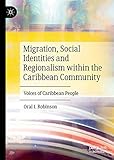Migration, Social Identities and Regionalism within the Caribbean Community [electronic resource] : Voices of Caribbean People / by Oral I. Robinson.
Material type: TextPublisher: Cham : Springer International Publishing : Imprint: Palgrave Macmillan, 2020Edition: 1st ed. 2020Description: XXII, 196 p. 2 illus. online resourceContent type: text Media type: computer Carrier type: online resourceISBN: 9783030477455Subject(s): Political sociology | Social structure | Social inequality | Emigration and immigration | Political Sociology | Social Structure, Social Inequality | MigrationAdditional physical formats: Printed edition:: No title; Printed edition:: No title; Printed edition:: No titleDDC classification: 306.2 LOC classification: JA76Online resources: Click here to access online
TextPublisher: Cham : Springer International Publishing : Imprint: Palgrave Macmillan, 2020Edition: 1st ed. 2020Description: XXII, 196 p. 2 illus. online resourceContent type: text Media type: computer Carrier type: online resourceISBN: 9783030477455Subject(s): Political sociology | Social structure | Social inequality | Emigration and immigration | Political Sociology | Social Structure, Social Inequality | MigrationAdditional physical formats: Printed edition:: No title; Printed edition:: No title; Printed edition:: No titleDDC classification: 306.2 LOC classification: JA76Online resources: Click here to access online Part I: Understanding Caribbean Societies Historically, Theoretically and Methodologically -- Chapter 1: The Caribbean Community (CARICOM): Integration, Intra-Regional Migration and Identities -- Chapter 2: A Concise Migration History of the Caribbean Community -- Chapter 3: Theorizing Migration and Identities -- Chapter 4: Researching Migration within a Cross-Caribbean Context -- Part II: Bases of Social Identities in the Caribbean -- Chapter 5: Caribbean Identity -Myth or Facts -- Chapter 6: Making Sense of Caribbean Citizenship and Migration -- Chapter 7: Perceptions of Regionalism and Impacts on social identities -- Part III: Migration, Citizenship & Identities -- Chapter 8: Intra-Caribbean Movement and Social Identities -- Chapter 9: Realities of Living within Other CARICOM Countries.-Chapter 10: Conclusions: Reconciling Practice, Policy and Theory in Caribbean Migrations.
This book offers theoretical and empirical analyses of intra-Caribbean migration, regionalism and the construction of identities from the perspective of CARICOM nationals. It offers explanations as to why current attempts to promote intra-regional people mobility in the Caribbean have been met with and mixture of excitement, skepticism, tension and anxiety by regional governments, businesses and organizations, and CARICOM nationals. Through data derived from a multi-methods study within the 15 member countries of CARICOM using behavioural ‘bottom-up’, individual-level perspectives, this volume presents novel insights on substantive questions such as: How do intra-CARICOM migrants perceive and negotiate their identities? How do they narrate their lived experiences in other Caribbean countries, and how do perceptions of regional integration mediate these processes? While making empirical, methodological and theoretical contributions to the study of regional identities in the Caribbean, this work also offers practical and policy solutions to regional migration issues.
